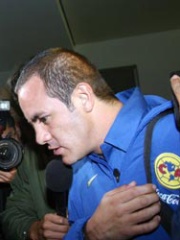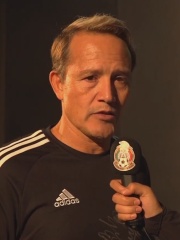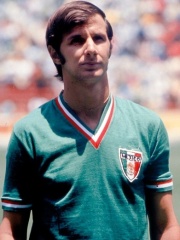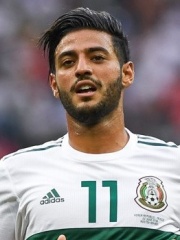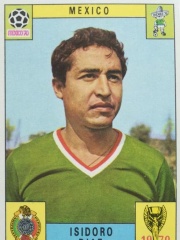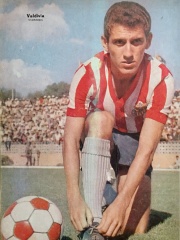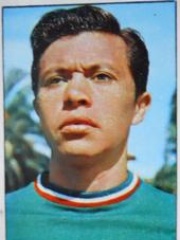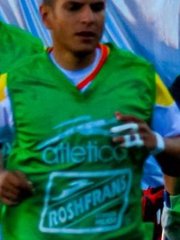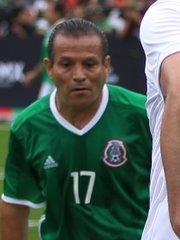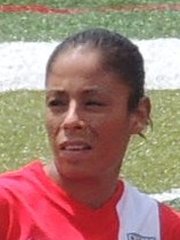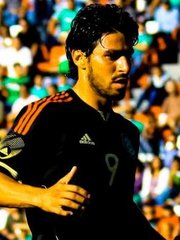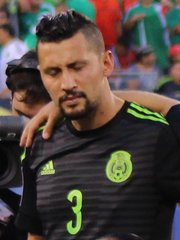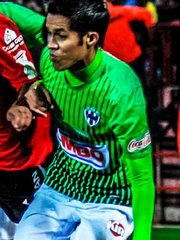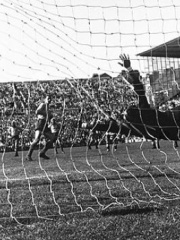
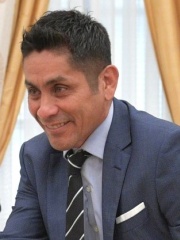

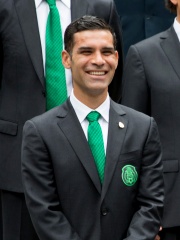
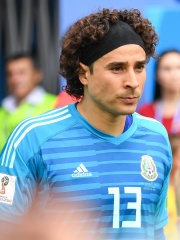



The Most Famous
SOCCER PLAYERS from Mexico
This page contains a list of the greatest Mexican Soccer Players. The pantheon dataset contains 21,273 Soccer Players, 257 of which were born in Mexico. This makes Mexico the birth place of the 20th most number of Soccer Players behind Croatia, and Russia.
Top 10
The following people are considered by Pantheon to be the top 10 most legendary Mexican Soccer Players of all time. This list of famous Mexican Soccer Players is sorted by HPI (Historical Popularity Index), a metric that aggregates information on a biography's online popularity. Visit the rankings page to view the entire list of Mexican Soccer Players.

1. Antonio Carbajal (1929 - 2023)
With an HPI of 65.00, Antonio Carbajal is the most famous Mexican Soccer Player. His biography has been translated into 27 different languages on wikipedia.
Antonio Félix "Tota" Carbajal Rodríguez (Spanish pronunciation: [anˈtonjo kaɾβaˈxal]; 7 June 1929 – 9 May 2023) was a Mexican professional footballer who played as a goalkeeper. He was also called "El Cinco Copas", in reference to his record of having played five World Cups.

2. Jorge Campos (b. 1966)
With an HPI of 63.39, Jorge Campos is the 2nd most famous Mexican Soccer Player. His biography has been translated into 34 different languages.
Jorge Campos Navarrete (born 15 October 1966) is a Mexican professional football coach and player who plays as a goalkeeper for Tercera Federación – Group 7 club México FC. A notable player of Mexico in the 1990s and early 2000s, Campos was an eccentric player, known for his constant play outside the penalty area – often functioning as a sweeper-keeper, as well as his acrobatic, risky, and flamboyant style of goalkeeping, and his colourful playing attire. His main strengths as a goalkeeper were his leaping ability, athleticism, and speed when rushing off his line, as well as his ability to organize his defense, which enabled him to overcome his short stature. He was regarded as one of the best goalkeepers of his generation. Campos also made for an effective striker, an example of versatility that is rarely seen in football. At times, he would start a game in goal, and transfer upfield later in the match, mostly at the club level. In total, he scored 35 goals throughout his career, scoring all but one while playing for UNAM. His trademark, self-designed bright kits contributed to his popularity.

3. Manuel Rosas (1912 - 1989)
With an HPI of 62.06, Manuel Rosas is the 3rd most famous Mexican Soccer Player. His biography has been translated into 23 different languages.
Manuel Rosas Sánchez (17 April 1912 – 20 February 1989), nicknamed Chaquetas, was a Mexican footballer who participated in the inaugural 1930 FIFA World Cup. Scoring against Argentina from what was the first ever penalty in the competition, 18-year-old Rosas became the youngest goalscorer in the FIFA World Cup at the time, and today remains the second youngest, after Pelé. In the same match Rosas scored his only other goal for the national team, thereby becoming the first Mexican to score twice in the tournament. Three days earlier, Rosas had scored the first ever own goal in the competition, during a match against Chile. His brother, Felipe Rosas, also played in the 1930 World Cup. Both were players of Atlante F.C. during the tournament.

4. Rafael Márquez (b. 1979)
With an HPI of 61.00, Rafael Márquez is the 4th most famous Mexican Soccer Player. His biography has been translated into 59 different languages.
Rafael Márquez Álvarez (Spanish: [rafaˈel ˈmaɾkes] ; born 13 February 1979) is a Mexican football coach and former player who played as a defender. He is currently the assistant coach of the Mexico national team. Nicknamed El Káiser, he is regarded as the best defender in Mexico's history and one of the best Mexican players of all time. Márquez began his career with Atlas in 1996, playing in over 70 games with the club before moving to France in 1999 with Monaco, where he won a Ligue 1 title. In 2003, Márquez joined Barcelona, becoming the first ever Mexican to represent the club. He would go on to play in over 240 games during seven seasons with the Blaugrana and win numerous honors, including four La Liga titles and two UEFA Champions League titles. In 2006, he became the first Mexican player to win the Champions League when Barcelona defeated Arsenal in the final. In 2010, Márquez joined Major League Soccer club New York Red Bulls. After being released from the club in 2012, he returned to his native Mexico, this time to play for León, captaining the team to back-to-back Liga MX titles in 2013 and 2014. Márquez then transferred to Hellas Verona of the Italian Serie A. He returned to his boyhood club Atlas in 2015, and announced his retirement from football in April 2018. Márquez is the fourth most-capped player in the history of the Mexico national football team, earning 147 caps throughout his career. In 2018, he became only the fourth player to play for his national team in five consecutive editions of the FIFA World Cup, alongside compatriot Antonio Carbajal, Lothar Matthäus, and Gianluigi Buffon, appearing in the 2002, 2006, 2010, 2014, and 2018 tournaments. He is also the Mexican player with the most World Cup matches played with 19. With the national team, Márquez won the 1999 FIFA Confederations Cup, and the 2003 and 2011 editions of the CONCACAF Gold Cup.
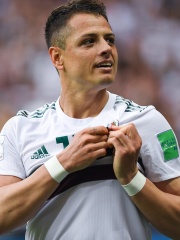
5. Javier Hernández (b. 1988)
With an HPI of 60.86, Javier Hernández is the 5th most famous Mexican Soccer Player. His biography has been translated into 67 different languages.
Javier Hernández Balcázar (Spanish: [xaˈβjeɾ eɾˈnandes βalˈkasaɾ] ; born 1 June 1988), commonly known by the nickname Chicharito ([tʃitʃaˈɾito], Mexican Spanish: little pea), is a Mexican professional footballer who plays as a striker for Liga MX club Guadalajara. He is known for his clinical finishing, pace, and technical ability. He is widely considered among the greatest Mexican players of all time, and regarded as one of the best North American players of all time. Hernández began his senior club career at age 18 in 2006, playing for Guadalajara, where he won the Primera División. In 2010, Hernández signed for Manchester United, becoming the club's first Mexican player. During his five years with United, he amassed over 150 appearances. He scored 59 goals, winning two Premier League titles, the Sir Matt Busby Player of the Year in his first season, and reached the 2011 UEFA Champions League Final, as well as setting the then record for the fifth-best minutes-per-goal ratio (130.2) in league history. Hernández departed the club on loan to Real Madrid in 2014, winning the FIFA Club World Cup, and in 2015 he joined Bayer Leverkusen on a permanent deal. Hernández returned to England two years later and signed for West Ham United. In 2019, he signed for Sevilla before joining LA Galaxy the following year. In 2024, Hernández rejoined his boyhood club Guadalajara. A Mexican international, Hernández is the country's all-time leading goalscorer. He debuted for the national team in September 2009 in a friendly match against Colombia. He has represented Mexico at the 2010, 2014, and 2018 FIFA World Cups, the 2011 CONCACAF Gold Cup, the 2013 and 2017 FIFA Confederations Cups, and the Copa América Centenario. He was the 2011 Gold Cup's top scorer with seven goals and was named the tournament's most valuable player. Hernández is commonly known by the nickname Chicharito, translated from Spanish as “little pea”, a diminutive of his father’s nickname Chícharo. He is also referred to as CH14, reflecting his initials and shirt number. In December 2023, while streaming on Twitch, he adopted the nickname ChichaGod (or ChichaDios in Spanish). Hernández is active as a gamer and social commentator on YouTuber and Twitch. As a streamer, under the username “CH14”, he has amassed over 623,000 followers on YouTube and 977,000 followers on Twitch as of November 2025.

6. Guillermo Ochoa (b. 1985)
With an HPI of 58.57, Guillermo Ochoa is the 6th most famous Mexican Soccer Player. His biography has been translated into 56 different languages.
Francisco Guillermo Ochoa Magaña (Spanish pronunciation: [ɡiˈʝeɾmo oˈtʃo.a]; born 13 July 1985), commonly known as "Memo Ochoa", is a Mexican professional footballer who plays as a goalkeeper for Cypriot First Division club AEL Limassol and the Mexico national team. A Mexican international since 2005, Ochoa received his first cap at age 20 in a friendly match against Hungary. Having been included in the squads for five FIFA World Cups (2006, 2010, 2014, 2018, and 2022), Ochoa has gained international recognition for his consistency and big game performances in the competition over multiple iterations. He has also appeared at two FIFA Confederations Cups (2013 and 2017), two Olympic tournaments (2004 and 2020), two Copas América (2007 and 2016), one Toulon Tournament (2005), one CONCACAF Pre-Olympic Tournament (2008), four CONCACAF Nations Leagues (2019–20, 2022–23, 2023–24, and 2024–25), seven CONCACAF Gold Cups (2005, 2007, 2009, 2015, 2019, 2023, and 2025), and was originally in the 2011 Gold Cup squad before being suspended due to false doping allegations. With six Gold Cup titles, he is the most successful player in the history of the competition. Known for his world class performances in European leagues and international tournaments, he is well regarded for his World Cup exploits.

7. Tomás Balcázar (1931 - 2020)
With an HPI of 58.06, Tomás Balcázar is the 7th most famous Mexican Soccer Player. His biography has been translated into 20 different languages.
Tomás Balcázar González (4 May 1931 – 26 April 2020) was a Mexican professional footballer who played as a forward. He played at club level for Guadalajara, and internationally for Mexico.

8. José Ruiz (b. 1904)
With an HPI of 57.76, José Ruiz is the 8th most famous Mexican Soccer Player. His biography has been translated into 16 different languages.
José Ruiz (born 1904, date of death unknown) was a Mexican football forward who made two appearances for Mexico at the 1930 FIFA World Cup. Ruiz is deceased.

9. Alfredo del Águila (1935 - 2018)
With an HPI of 57.66, Alfredo del Águila is the 9th most famous Mexican Soccer Player. His biography has been translated into 18 different languages.
Alfredo del Águila Estrella (3 January 1935 – 26 July 2018) was a Mexican football forward who played for Mexico in the 1962 FIFA World Cup. He also played for Deportivo Toluca and Club de Futbol America.

10. Cristóbal Ortega (1956 - 2025)
With an HPI of 57.30, Cristóbal Ortega is the 10th most famous Mexican Soccer Player. His biography has been translated into 20 different languages.
Cristóbal Ortega Martínez (25 July 1956 – 2 January 2025) was a Mexican professional footballer who played as a midfielder for América in the Mexican Primera División from 1974 to 1992. He also played for the Mexico national team, including playing in the World Cups of 1978 and 1986. He earned 24 caps and scored four goals in his international career.
People
Pantheon has 257 people classified as Mexican soccer players born between 1896 and 2004. Of these 257, 196 (76.26%) of them are still alive today. The most famous living Mexican soccer players include Jorge Campos, Rafael Márquez, and Javier Hernández. The most famous deceased Mexican soccer players include Antonio Carbajal, Manuel Rosas, and Tomás Balcázar. As of April 2024, 13 new Mexican soccer players have been added to Pantheon including Jaime Lozano, Raúl Servín, and Maribel Domínguez.
Living Mexican Soccer Players
Go to all RankingsJorge Campos
1966 - Present
HPI: 63.39
Rafael Márquez
1979 - Present
HPI: 61.00
Javier Hernández
1988 - Present
HPI: 60.86
Guillermo Ochoa
1985 - Present
HPI: 58.57
Cuauhtémoc Blanco
1973 - Present
HPI: 56.33
Luis Hernández
1968 - Present
HPI: 56.28
Enrique Borja
1945 - Present
HPI: 54.68
Giovani dos Santos
1989 - Present
HPI: 54.41
Carlos Vela
1989 - Present
HPI: 54.26
Isidoro Díaz
1938 - Present
HPI: 54.25
Javier Valdivia
1941 - Present
HPI: 53.99
Elías Muñoz
1941 - Present
HPI: 53.47
Deceased Mexican Soccer Players
Go to all RankingsAntonio Carbajal
1929 - 2023
HPI: 65.00
Manuel Rosas
1912 - 1989
HPI: 62.06
Tomás Balcázar
1931 - 2020
HPI: 58.06
José Ruiz
1904 - Present
HPI: 57.76
Alfredo del Águila
1935 - 2018
HPI: 57.66
Cristóbal Ortega
1956 - 2025
HPI: 57.30
Juan Carreño
1909 - 1940
HPI: 56.99
Alfredo Hernández
1935 - 2003
HPI: 56.89
Jesús Castro
1908 - Present
HPI: 56.67
Francisco Jara
1941 - 2024
HPI: 56.35
Óscar Bonfiglio
1905 - 1987
HPI: 55.65
Dionisio Mejía
1907 - 1963
HPI: 55.62
Newly Added Mexican Soccer Players (2025)
Go to all RankingsJaime Lozano
1979 - Present
HPI: 44.93
Raúl Servín
1963 - Present
HPI: 44.90
Maribel Domínguez
1978 - Present
HPI: 39.45
Rafael Márquez Lugo
1981 - Present
HPI: 38.58
Israel López
1974 - Present
HPI: 38.20
Daniel Osorno
1979 - Present
HPI: 38.07
Yasser Corona
1987 - Present
HPI: 33.33
Érick Sánchez
1999 - Present
HPI: 33.14
Severo Meza
1986 - Present
HPI: 32.76
Roberto de la Rosa
2000 - Present
HPI: 32.71
Sebastián Jurado
1997 - Present
HPI: 32.68
Carlos Cisneros
1993 - Present
HPI: 31.84
Overlapping Lives
Which Soccer Players were alive at the same time? This visualization shows the lifespans of the 25 most globally memorable Soccer Players since 1700.

